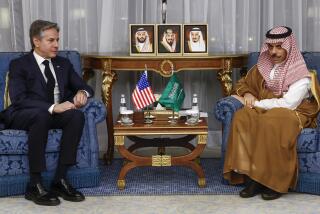As U.S. prepares to open embassy in Jerusalem, Middle East braces for more unrest
One week before the planned May 14 inauguration of the U.S. Embassy in Jerusalem, Nir Barkat, the city’s mayor, climbed up a ladder and grandly installed a sign reading “U.S. Embassy” in English, Arabic and Hebrew.
“This is not a dream — it’s reality!” he posted on his Facebook page beneath a picture of himself, attired in a black suit, affixing the sign to a pole.
“I thank President Trump for making this historic moment come to fruition,” he wrote. “Jerusalem is the eternal capital of the Jewish people — and the world is beginning to recognize this fact.”
There is little reason to think that is the case, though Paraguay, Guatemala, the Czech Republic and a handful of other countries will follow the American move in the coming weeks.
And for most Jerusalem Arabs, May 14 is a day to lament.
The Palestinian Authority claims East Jerusalem for the capital of a future state, but because of historic peculiarities, five of the nine nations that maintain representative missions to the Palestinian Authority in Jerusalem, including the United States, have their diplomatic facilities in West Jerusalem — the section that is generally considered Israeli.
The Palestinian Authority government vigorously protests Trump’s decision to relocate the U.S. Embassy from Tel Aviv, saying it is an infringement of its sovereignty — while not asserting any claim to sovereignty over West Jerusalem.
Gold-embossed invitations sent out by U.S. Ambassador David Friedman and his wife, Tammy, exuberantly summon guests to “the Opening of the United States Embassy in Jerusalem, Israel,” on May 14, commemorating the date on which Israel declared its independence in 1948.
Among those joining Friedman will be the president’s daughter Ivanka Trump and her husband, White House senior advisor Jared Kushner, as well as Treasury Secretary Steven T. Mnuchin and Jason Greenblatt, Trump’s special representative for international negotiations.
About 800 guests, including a large congressional delegation, members of the Republican Jewish Coalition and leaders of American Orthodox Jews, will be crammed into what has until now been a consulate serving U.S. citizens and visa applicants in Arnona, a leafy, quiet neighborhood in Jerusalem’s south.
During the ceremony, signs declaring the site as an embassy will be unveiled and the 80 to 100 consular employees will become employees of the United States.
But not a single employee, for now, is leaving the fortress-like U.S. Embassy in Tel Aviv, where 800 people work. That building will be renamed the new embassy’s “Tel Aviv Branch Office.”
It will take several years before a new site is scouted and a new embassy is designed, approved and built, so for now, the move is symbolic — but still substantial.
This week, Israeli Defense Minister Avigdor Lieberman hailed Trump’s “historic, important and dramatic” decision, but added a cautionary note.
“Nothing is free, and the opening of the U.S. Embassy in Jerusalem will come at a price, and it is worth paying it. We should be prepared to pay a price.”
May 15, one day after the ceremony, is the date Palestinians mark the Nakba, or catastrophe, that befell them when they were displaced by the war that broke out after Israel’s establishment.
The Israeli army anticipates that the confluence of both dates, plus a massive rally planned for Nakba Day on its southern border with the Gaza Strip, which is ruled by the Islamist militia Hamas, could provoke new violence in Jerusalem and in the West Bank, the semiautonomous territory where the Palestinian Authority is based.
Trump’s decision in December to move the embassy to Jerusalem overturned decades of U.S. policy and was met with elation in Israel and consternation in most of the world. Behind the controversy, however, lies a strange history that dates to Israel’s founding.
The official reason embassies accredited to Israel are not located in Jerusalem is an esoteric construct called “corpus separatum,” a Latin term meaning “separated body,” devised by United Nations officials in late 1947 as they scrambled to find an internationally acceptable status for the Holy City when the British mandate in Palestine came to an end and it was divided into an Arab state and a Jewish state.
The officials came up with a concept that detached Jerusalem from any state, turning it into an enclave to be administered by a U.N. committee. In real life, Jerusalem was divided between Jordan and Israel during the armistice of 1949, never coming into existence as a stateless entity.
Israel declared West Jerusalem, which it held, as its capital in 1948, and its parliament, ministries and Supreme Court are located here. The international community held to the notion of a “corpus separatum” and installed embassies in coastal Tel Aviv.
The result of this disconnect is diplomats commuting an hour from Tel Aviv every time they present credentials to the Israeli president at his official residence, meet with Israeli ministers or attend state dinners.
Trump’s decision to relocate the embassy prompted a rebuke from the U.N., which in December voted 128 to 9, with 35 abstentions, to condemn the move. Palestinian Authority President Mahmoud Abbas at the time slammed what he called the “destruction of all the efforts to achieve peace.”
Yossi Beilin, an architect of the Oslo peace accords between Israel and the Palestine Liberation Organization, and a former Israeli minister of justice and deputy minister of foreign affairs, this week expressed bewilderment over the hullabaloo surrounding the embassy move.
“The Palestinian claim that opening an American Embassy in West Jerusalem — in unarguably western Jerusalem — somehow abrogates Oslo is just not true,” he said. “I don’t understand why they are staking so much on this claim.”
Tarnopolsky is a special correspondent.
More to Read
Start your day right
Sign up for Essential California for news, features and recommendations from the L.A. Times and beyond in your inbox six days a week.
You may occasionally receive promotional content from the Los Angeles Times.






